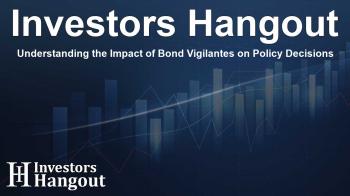Understanding the Impact of Bond Vigilantes on Policy Decisions

Understanding the Bond Vigilantes' Influence
When new administrations take charge, they often face a multitude of challenges. One of the unexpected hurdles can come from bond traders, aptly termed 'bond vigilantes.' This term refers to market players who react to government policies by trading bonds, impacting national economic stability.
The Challenge of Rising Debt
Consider the scenario faced by policymakers when the U.S. debt approaches significant milestones. For instance, during certain presidencies, the rapid escalation of national debt as a percentage of GDP sparked concerns. Current trends suggest a stark reality: the U.S. debt-to-GDP ratio is nearing a concerning 100%. This could evoke memories of previous administrations that similarly grappled with the specter of bond vigilantes.
Bond Yields and Economic Implications
Another key indicator to monitor is bond yields. These yields often rise in reaction to government borrowing, presenting a precarious situation for any administration with ambitious fiscal plans. Recent increases in the yield on 10-year U.S. Treasury bonds signal that the market's confidence might be waning, leading to potential challenges for future economic agendas.
Historical Context
The experiences of past leaders, like Bill Clinton, illustrate the powerful role bond markets can play. Clinton faced intense pressure from bond traders, which led to significant policy changes during his time in office. Such historical instances underscore the need for current administrations to navigate bond market expectations carefully.
Gaining Insight from Financial Experts
To better understand these dynamics, discussions with economists and political advisors shed light on potential scenarios. Many experts caution that unchecked spending could rekindle the influence of bond vigilantes, prompting a re-examination of fiscal policies.
Global Perspectives on Bond Markets
The implications of bond market dynamics are not contained to just one nation. As countries grapple with their financial futures, leaders must consider the interplay between domestic policies and global responses. With world public debt projected to surpass $100 trillion, the stakes are high.
Regional Risks Amplified
Moreover, emerging risks in international markets can ripple back to the U.S., amplifying concerns about the effects of stringent fiscal policies. Economies in Europe have also shown signs of strain, indicating that actions in one territory can influence markets worldwide.
The Role of the Federal Reserve
Another vital player in this equation is the Federal Reserve. Their interventions can help stabilize markets, but reliance on these actions introduces its own risks. Historically, rapid shifts in monetary policy can unsettle bond markets, triggering reactions that leaders must manage proactively.
Preparing for Potential Market Shifts
What can be done to mitigate potential fallout? A proactive approach involves establishing a clear fiscal strategy that reinforces market confidence. This could include transparent communication regarding government spending and tax policy, particularly as various economic indicators evolve.
Monitoring Key Economic Indicators
Keep an eye on critical statistics such as inflation rates, growth expectations, and government debt levels. These elements form the backbone of bond market evaluations and can signal impending shifts in confidence that might provoke bond vigilantes.
Building a Resilient Economy
Ultimately, fostering a resilient economy requires balancing growth ambitions with prudent borrowing. Leaders must aim for policies that do not just address immediate funding needs but also contribute to long-term economic sustainability.
Frequently Asked Questions
What are bond vigilantes?
Bond vigilantes are bond market participants who sell government bonds in response to economic policies they perceive as fiscally irresponsible, leading to rising interest rates.
Why is the debt-to-GDP ratio important?
A high debt-to-GDP ratio indicates that a country may struggle to pay off its debt and can signal potential economic instability, impacting investor confidence.
How do bond yields affect economic policies?
Rising bond yields increase borrowing costs for the government, which can lead to changes in economic policies aimed at ensuring fiscal discipline and growth.
What role does the Federal Reserve play?
The Federal Reserve influences interest rates through monetary policy, impacting bond yields and market stability. Their actions can help mitigate or exacerbate bond market responses to fiscal policies.
How can governments regain market confidence?
Governments can restore market confidence by implementing transparent and sustainable fiscal policies, reducing debt levels, and clearly communicating economic strategies to investors.
About The Author
Contact Kelly Martin privately here. Or send an email with ATTN: Kelly Martin as the subject to contact@investorshangout.com.
About Investors Hangout
Investors Hangout is a leading online stock forum for financial discussion and learning, offering a wide range of free tools and resources. It draws in traders of all levels, who exchange market knowledge, investigate trading tactics, and keep an eye on industry developments in real time. Featuring financial articles, stock message boards, quotes, charts, company profiles, and live news updates. Through cooperative learning and a wealth of informational resources, it helps users from novices creating their first portfolios to experts honing their techniques. Join Investors Hangout today: https://investorshangout.com/
The content of this article is based on factual, publicly available information and does not represent legal, financial, or investment advice. Investors Hangout does not offer financial advice, and the author is not a licensed financial advisor. Consult a qualified advisor before making any financial or investment decisions based on this article. This article should not be considered advice to purchase, sell, or hold any securities or other investments. If any of the material provided here is inaccurate, please contact us for corrections.

